

APRIL • VOL. 4 • SERIES OF 2025
INSIGHTS is a monthly publication of BDB LAW to inform, update and provide perspectives to our clients and readers on significant tax-related court decisions and regulatory issuances (includes BIR, SEC, BSP, and various government agencies).
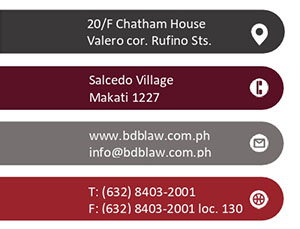
DISCLAIMER: The contents of this Insights are summaries of selected issuances from various government agencies, Court decisions, and articles written by our experts. They are intended for guidance only and as such should not be regarded as a substitute for professional advice.
Copyright © 2025 by Du-Baladad and Associates (BDB Law). All rights reserved. No part of this issue covered by this copyright may be produced and/or used in any form or by any means – graphic, electronic, and mechanical without the written permission of the publisher.
What's Inside ...
- HIGHLIGHTS FOR MARCH 2025
- SIGNIFICANT COURT DECISIONS
- Court of Tax Appeals
- SIGNIFICANT REGULATORY ISSUANCES
- Bureau of Internal Revenue
- PUBLISHED ARTICLE
- VAT on Local Sales of RBEs
- OUR EXPERTS
- GLOSSARY


HIGHLIGHTS for MARCH 2025
COURT OF TAX APPEALS DECISIONS
- Should the CIR grant the request for reinvestigation and the same results in a reconsidered or modified assessment, the period for collection should begin to run from the date of the said assessment. (Master Sports Corporation v. Commissioner of Internal Revenue, CTA Case No. 10490, March 13, 2025)
-
Substituted service can only be resorted to when the party is not present at the registered or known address. (Regus PLT Centre, Inc. v. Commissioner of Internal Revenue, CTA Case No. 10778, March 11, 2025)
-
In a refund claim premised upon illegal, erroneous, or excessive collection of taxes, the Court is permitted to determine the proper tax liability other than that paid by the claimant. (ING Bank, N.V. Manila Branch v. Commissioner of Internal Revenue, CTA Case No. 10520, March 19, 2025)
- All products categorized as toilet waters are subject to excise tax, regardless of their price or market reach. (Green Cross, Inc. v. Commissioner of Internal Revenue, CTA EB No. 2912, March 3, 2025)
- Subject to certain exceptions, only the Solicitor General can bring or defend actions on behalf of the Republic of the Philippines. (Commissioner of Internal Revenue v. One Cypress Agri-Solutions, Inc., CTA EB No. 2813, March 5, 2025)
- Requests for reinvestigation must specify the newly discovered or additional evidence the taxpayer intends to present. (Suburbia Automotive Ventures, Inc. v. Commissioner of Internal Revenue, CTA Case No. 10128, March 3, 2025)
- The taxpayer, being neither an RE entity nor purporting to be one but acting solely as a subcontractor of RE entities, need not furnish the qualifications required of an RE entity. (Air Drilling Associates PTE Ltd., vs. Commissioner of Internal Revenue – CTA Case No. 10957, March 7, 2025)
- The taxpayer could not avoid deficiency tax liability based solely on the technical issue of an invalid waiver, where the flaws were patent on the face of all three waivers and not questioned. (DMCI Mining Masbate Power Corporation vs. Commissioner of Internal Revenue, CTA Case No. 10424, March 13, 2025)
BIR ISSUANCES
- RMC No. 21-2025, March 24, 2025– This clarifies the proper tax treatment of Joint Ventures/Consortiums formed for the purpose of undertaking construction projects, including the imposable taxes of co-venturers/members of a Joint Venture/Consortium not taxable as a corporation and their respective administrative compliance.
- RMC No. 20-2025, March 20, 2025 – This clarifies certain policies, guidelines, and procedures relative to the processing and issuance of Tax Clearance Certificate for Final Settlement of Government Contracts.
- RR No. 12-2025, March 6, 2025 – This further amends Section 5 of Revenue Regulations No. 3-69, relative to the due process requirement in the service and execution of summary remedies.
- RR No. 13-2025, March 31, 2025 – This provides for the consolidated provisions to simplify and streamline the procedures and requirements relative to the availment of the tax exemptions and incentives granted to participating private entities under RA No. 8525 or the “Adopt-a-School Act of 1998”, RA No. 12063 or the “Enterprise-Based Education and Training (EBET) Framework Act”, and the Tax Code.

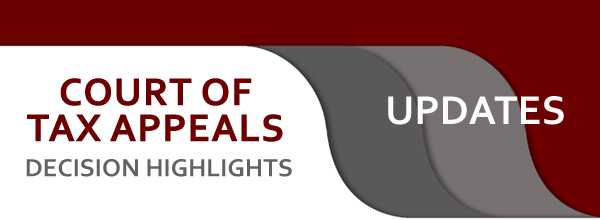
In a refund claim premised upon illegal, erroneous, or excessive collection of taxes, the Court is permitted to determine the proper tax liability other than that paid by the claimant.
In relation to a sale and transfer of shares of stock, the taxpayer erroneously paid the relevant taxes to the wrong RDO. It eventually paid a second time to the correct RDO and filed an administrative claim with the BIR requesting for the refund or credit of the erroneously or excessively paid CGT, among others.
The Court partially granted the refund claim.
It held that in a refund claim premised upon illegal, erroneous, or excessive collection of taxes, the Court is permitted to determine the proper tax liability other than that paid by the claimant. Above and beyond, if there exists tax liability other than that paid, the Court is bound to subtract it from the refundable amount.
The Court found that the taxpayer made use of the wrong tax rate in computing for the CGT, which resulted in underpayment of the correct tax. Although the taxpayer subsequently paid the difference, it was done belatedly and without any corresponding surcharge and interest.
Considering that the taxpayer should have been liable for surcharge and interest, the Court subtracted the same from the refundable amount. (ING Bank, N.V. Manila Branch v. Commissioner of Internal Revenue, CTA Case No. 10520, March 19, 2025)
Substituted service can only be resorted to when the party is not present at the registered or known address.
This is a Petition requesting to declare as null and void, and to set aside, the WOG and Assessment Notices issued by BIR. The taxpayer alleges non-receipt of the PAN, FLD /FAN subject of the WOG and WDL.
The BIR claims in its Answer that the RO initially served the PAN by personal service, but since no one was found in the taxpayer’s office, she resorted to serving the same by substituted service through a barangay official.
The Court ruled in favor of the taxpayer. Substituted service can only be resorted to when the party is not present at the registered or known address. The server, who is the RO assigned to the case or any BIR employee duly authorized for the purpose, shall also prepare a written report in triplicate copies, which shall be under oath, setting forth the manner, place and date of service, the name of the person/barangay official/professional courier service company who received the same and such other relevant information.
Here, nowhere can it be seen from the evidence presented by the BIR that the said PAN was actually served by substituted service to and received by the barangay official indicated in the Acknowledgment Receipt and written report. Neither did the BIR's witnesses identify and authenticate the signature of the barangay official, and witnesses indicated in the Acknowledgment Receipt. Consequently, given that the assessment notices are void, the issuance of the WDL and WOG are likewise invalid and devoid of any legal foundation. (Regus PLT Centre, Inc. v. Commissioner of Internal Revenue, CTA Case No. 10778, March 11, 2025)
Should the CIR grant the request for reinvestigation and the same results in a reconsidered or modified assessment, the period for collection should begin to run from the date of the said assessment.
The taxpayer argues that the BIR’s right to collect the alleged deficiency taxes has already prescribed. To refute the taxpayer’s argument, the BIR argues that the period to collect the deficiency taxes was effectively suspended when the taxpayer filed its Protest to the FAN (through a request for reinvestigation) and its first MR to the FDDA, and both requests were duly granted and assigned to ROs for further evaluation.
The Court ruled in favor of the taxpayer.
It held that, should the CIR grant the request for reinvestigation and the same results in a reconsidered or modified assessment, the period for collection should begin to run from the date of the said assessment. The period for collection of the assessed taxes begins to run on the date that the assessment notice had been released, mailed, or sent to the taxpayer.
Here, the BIR's clear and unequivocal grant of the request for reinvestigation, the prescriptive period to collect (of 30 June 2015) was deemed suspended. However, the BIR issued the FDDA on 04 November 2015. Counting five (5) years therefrom, BIR had until 05 November 2020 to collect the deficiency taxes. The BIR's right to collect the deficiency taxes (after considering the COVID-19 issuances) now fell on 05 June 2021. Therefore, before the said date, the BIR should have initiated collection through the sanctioned methods.
Despite taxpayer’s filing of the instant Petition for Review on 19 March 2021, the records indicate that it was only on 16 July 2021 that the BIR filed its Answer and demanded for the payment of the deficiency taxes. Hence, the same was filed beyond the prescriptive period to collect on 05 June 2021. (Master Sports Corporation v. Commissioner of Internal Revenue, CTA Case No. 10490, March 13, 2025)
All products categorized as toilet waters are subject to excise tax, regardless of their price or market reach.
This is a Petition filed by the taxpayer for administrative claim for refund of its alleged erroneously paid excise taxes and VAT on excise taxes with the BIR. The taxpayer argues that its splash cologne/cologne products are not "non-essential goods" subject to excise tax since they are basic and common commodities not intended solely for personal adornment or embellishment.
The Court upheld the denial of the claim for refund. It held that the NIRC imposes excise tax on toilet waters without any price-based qualifications. Therefore, all products categorized as toilet waters are subject to excise tax, regardless of their price or market reach. Moreover, the term "non-essential goods," as commonly understood, refers to the functionality of the products rather than their market value.
Here, following the valid and binding interpretation made by the CIR in RMC No. 17-02, cologne products/splash colognes are considered "toilet waters", which are non-essential goods subject to the excise tax. (Green Cross, Inc. v. Commissioner of Internal Revenue, CTA EB No. 2912, March 3, 2025)
Subject to certain exceptions, only the Solicitor General can bring or defend actions on behalf of the Republic of the Philippines.
This is an appeal filed by the BIR on the Decision and Resolution promulgated by the Court in Division, which cancelled the deficiency tax assessments and lifted the Warrant of Garnishment issued against the taxpayer.
The Court denied the appeal due to the lack of authority by the BIR to file the appeal. It ruled that only the Solicitor General can bring or defend actions on behalf of the Republic of the Philippines and that actions filed in the name of the Republic, or its agencies and instrumentalities, for that matter, if not initiated by the Solicitor General, should be summarily dismissed. The only exceptions to this rule are: (i) when the government is adversely affected by the contrary position taken by the OSG; (ii) when there is an express authorization; or (iii) when the dismissal of the petition could have lasting effect on government tax revenues (such as when the issue involves the validity of a revenue regulation).
In the instant case, records show that no written authorization from the OSG was ever submitted as proof of authority to file the Petition on behalf of the OSG. (Commissioner of Internal Revenue v. One Cypress Agri-Solutions, Inc., CTA EB No. 2813, March 5, 2025)
Requests for reinvestigation must specify the newly discovered or additional evidence the taxpayer intends to present.
This is an appeal on the assessment issued by the BIR against the taxpayer for deficiency taxes. The BIR then issued the FLD and FAN, and the taxpayer filed its protest letter of even date against the FLD/FAN requesting for a reinvestigation, and the cancellation or setting aside of the said FLD/FAN. Subsequently, the taxpayer received the assailed FDDA and elevated the case to the CTA. The BIR argues that this Court has no jurisdiction over the Petition, and that the assessment has already become final, executory, and demandable
The Court denied the petition as it lacked jurisdiction to entertain the same. Requests for reinvestigation must specify the newly discovered or additional evidence the taxpayer intends to present. This is the logical outcome relevant to said requests, since by their nature, the plea for re-evaluation of the assessment is on the basis of the said evidence.
A review of the records shows that the taxpayer was only able to establish that it timely filed a protest stating therein that it is a request for reinvestigation. As such, the taxpayer has 60 days from the said date of filing to submit all relevant supporting documents. However, the taxpayer failed to show that it did so. Such being the case, the subject tax assessments, as embodied in the FLD/FAN, have already become final. (Suburbia Automotive Ventures, Inc. v. Commissioner of Internal Revenue, CTA Case No. 10128, March 3, 2025)
The taxpayer, being neither an RE entity nor purporting to be one but acting solely as a subcontractor of RE entities, need not furnish the qualifications required of an RE entity.
The taxpayer filed an administrative claim for refund for the unutilized input VAT attributable to zero-rated sales. It argued that the excess and unutilized VAT being claimed for refund are all attributable to its zero-rated sales of services to RE developers and entitled to zero-rated VAT on their purchases of supply of goods, properties, and services needed for development, construction, and installation of plant facilities. However, the BIR argues that the taxpayer failed to attach its DOE Certificate of Accreditation, thus making the taxpayer not entitled to the subject refund claim as it failed to submit complete documentation.
The Court granted the claim for refund. It ruled that the taxpayer, being neither an RE entity nor purporting to be one but acting solely as a subcontractor of RE entities, need not furnish the qualifications required of an RE entity. Rather, in order to avail itself of the indirect tax incentive, it suffices for the taxpayer to show that the RE entity to which it rendered services possesses the required DOE and BOI Certifications, which, in this case, were filed and proven during trial. (Air Drilling Associates PTE Ltd., vs. Commissioner of Internal Revenue, CTA Case No. 10957, March 7, 2025)
The taxpayer could not avoid deficiency tax liability based solely on the technical issue of an invalid waiver, where the flaws were patent on the face of all three waivers and not questioned
The taxpayer sought to cancel and set aside the Final Decision on Disputed Assessment issued against it by the BIR. It questioned the assessment on the ground that: (i) the waivers executed to waive prescription were defective and invalid; (ii) that the CIR deprived the taxpayer of due process rights in failing in his duty to give reason; (iii) and that the FAN/FLD was served after the due date indicated therein. The CIR argues that the waivers are valid, and they upheld the taxpayer’s due process rights.
The Court held the waivers to be valid, thus tolling the prescription. The taxpayer could not avoid deficiency tax liability based solely on the technical issue of an invalid waiver, where the flaws were patent on the face of all three waivers and not questioned. If the taxpayer earnestly took exception to the general scope of the waivers, it should have refused to sign these documents from the very beginning.
Nevertheless, the assessment is still cancelled for violation of the taxpayer’s due process rights. Verily, the BIR is authorized to make an assessment based on third party information, but it does not excuse the BIR to provide the factual and legal bases of the assessment and to include the disclosure of the source document/record and provision of the details thereof to allow the taxpayer to effectively address the findings. For failure to do so, the taxpayer was deprived of due process. (DMCI Mining Masbate Power Corporation vs. Commissioner of Internal Revenue, CTA Case No. 10424, March 13, 2025)

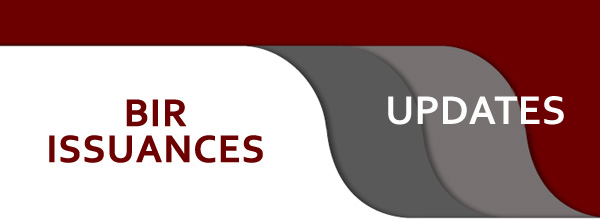
RMC No. 21-2025, March 24, 2025 – This clarifies the proper tax treatment of Joint Ventures/Consortiums formed for the purpose of undertaking construction projects, including the imposable taxes of co-venturers/members of a Joint Venture/Consortium not taxable as a corporation and their respective administrative compliance.
|
Registration |
Tax Treatment |
Administrative Compliance |
|
Joint Venture Not Taxable as Corporation |
||
|
Required to register with the BIR |
Subject to following tax:
Note: Income payments made by Joint Venture/Consortium, taxable or not taxable, to their local/resident supplier of goods and services other than those covered by other rates of withholding tax, shall be subject to the following withholding tax rates:
|
Mandatorily required to file an annual income tax return and shall be accompanied with audited financial statements. |
|
Co-venturer/Member of a Joint Venture Not Taxable as Corporation |
||
|
Required to register with the BIR |
Subject to the following:
|
Required to enroll to the BIR’s eFPS if construction undertaking exceeds 12 months. |
RMC No. 20-2025, March 20, 2025 – This clarifies certain policies, guidelines, and procedures relative to the processing and issuance of Tax Clearance Certificate for Final Settlement of Government Contracts.
The Tax Clearance Certificate for Final Settlement of Government Contracts shall be required and issued only for government contracts which involve the procurement of goods, consulting services, and infrastructure projects done through public bidding process pursuant to the “Government Procurement Reform Act,” as amended. Procurement involving small purchases is not required to secure the same.
Moreover, it shall be presented only prior to the final settlement of the government contracts with its suppliers on a per contract basis to ensure complete and timely payment and remittance of taxes.
A Tax Clearance Certificate for General Purposes, specifically for collection purposes, shall no longer be required from the contractor.
RR No. 12-2025, March 6, 2025 – This further amends the due process requirement in the service and execution of summary remedies.
The service and execution of warrants and notices shall be as follows:
- Individual taxpayers – The WDL shall be served personally upon the delinquent taxpayer himself/herself, his/her authorized representative, or a member of his/her household of legal age with sufficient discretion, who shall be required to acknowledge the receipt of the warrant by voluntarily signing his/her name on the receipt portion of the warrant.
- Corporations – The WDL shall be served to the President, Vice President, Manager, Treasurer, or Comptroller, or to any responsible person of the corporation who customarily receives correspondence for the corporation.
In cases, however, where the taxpayer (individual or corporation) refuses to receive the WDL or is absent from his/her given address, the WDL shall be constructively served by:
- requiring two (2) credible witnesses who are not BIR employees, preferably barangay officials, to sign in the acknowledgment receipt portion of the warrant and require a copy of the identification card as a proof of witness, and
- Leave the duplicate copy of the warrant at the premises of the taxpayer.
- A copy of the WDL, which was previously served constructively, shall be sent thru registered mail and/or electronic mail to the delinquent taxpayer.
For taxpayers previously reported and published as cannot be Located who have resurfaced, the issued WDL together with the copies of the served Warrants of Garnishment, Notice of Levy, Notice of Tax Lien, Notice of Encumbrance, and other correspondences shall be simultaneously served to such delinquent taxpayer or his/her authorized representative.
RR No. 13-2025, March 31, 2025
This provides for the consolidated provisions to simplify and streamline the procedures and requirements relative to the availment of the tax exemptions and incentives granted to participating private entities under RA No. 8525 or the “Adopt-a-School Act of 1998”, RA No. 12063 or the “Enterprise-Based Education and Training (EBET) Framework Act”, and the Tax Code.
REGISTERED EXPORT AND DOMESTIC ENTERPRISES
Incentives:
- Fifty percent (50%) additional deduction on the labor expense incurred in the taxable year.
Note: The said additional deduction on the labor expense shall not include salaries, wages, benefits, and other personnel costs incurred for managerial, administrative, indirect labor, and support services.
- One Hundred percent (100%) additional deduction on training expense increased in the taxable year.
Note: The additional training expense shall only apply to trainings, as approved by the Strategic Investment Priority Plan, given to the Filipino employees engaged directly in the registered business enterprise’s production of goods and services
Conditions Sine Qua Non in availment of Incentives:
- None
Documentary Proof:
- ITR with attached Certification from the DepED or CHED or TESDA;
- Sworn Declaration issued by applicant or its authorized officer as to the amount of the expenses being deducted and that the applicant has the requisite qualifications to avail of the incentives; and Invoices and other supporting documents to support the expenses.
ADOPTING PRIVATE ENTITIES [1]
Incentives:
- Deductions from the gross income of the amount of contribution/donation that were actually, directly, and exclusively incurred for the program;
- An Additional Fifty (50%) deduction of such contribution/donation, subject to certain conditions
- Exemption from Donor’s Tax
Conditions Sine Qua Non in availment of Incentives:
- The deduction shall be availed of in the taxable year in which the expenses have been paid or incurred; and
- The direct connection or relation of the expenses to the Adopting Private Entity’s participation in the Adopt-a-School Program.
Documentary Proof:
- Official invoice and other adequate records to substantiate the amount of expenses being claimed as deduction;
- List of projects and/or activities undertaken and the cost of each undertaking;
- Proof of acknowledgment or receipt of the contributed/donated property by the recipient public school;
- Duly notarized/approved agreement between the Adopting Private Entity and Public School;
- Duly Notarized Deed of Donation and Acceptance; and
- Sworn Declaration
TECHNICAL -VOCATIONAL INSTITUTIONS IMPLEMENTING A REGISTERED ENTERPRISE-BASED EDUCATION AND TRAINING (EBET) FRAMEWORK UNDER RA NO. 12063
Incentives:
- Fifty (50%) additional deduction of actual training expenses from the effectivity of RA No. 12063 up to December 31, 2027
Note: Starting January 1, 2028, the additional deduction shall increase to seventy-five (75%) of the actual training expense: Provided further, that such deduction shall not exceed five (5%) of their total direct labor expenses, or P25,000,000 a year, whichever is lower.
- Exemption from Donor’s tax; and
- Deduction of donation from the gross income of the donor
Conditions Sine Qua Non in availment of Incentives:
- The entity shall secure the proper certification from the TESDA
Documentary Proof:
- ITR with attached Certification from TESDA;
- Sworn Declaration issued by the authorized officer of the enterprise as to the amount of expense being deducted and that the enterprise has the requisite qualification to avail of the incentives; and
- Official invoices and other supporting documents
- Donor’s tax return and ITR;
- Original or Certified True Copy (CTC) of duly notarized Deed of Donation and Acceptance;
- Original or CTC of Certification from TESDA that the donation, contribution, bequests, subsidies, or financial aid are actually, directly, and exclusively used for the conduct of a registered EBET Program; and
- Official invoices and other supporting documents
[1] Refers to aid/help/contribution provided by an Adopting Private Entity to public school

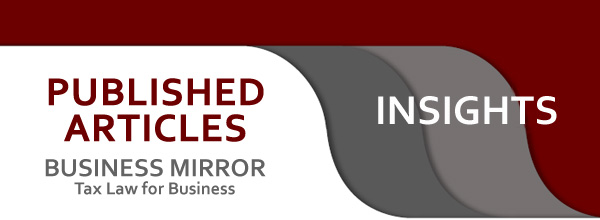
VAT on Local Sales of RBEs
By Atty. Fulvio D. Dawilan
CREATE MORE (Republic Act No. 12066) made significant clarifications on the taxation of and incentives enjoyed by registered business enterprises (RBEs) – enterprises which are registered with various Investment Promotion Agencies (IPAs). Among those clarified are the value-added tax (VAT) treatment of the local sales made by these RBEs. Specifically, as the law now stands, local sales of RBEs are clearly subject to the usual 12% VAT.
And what are these local sales? As defined by CREATE MORE, “local sales” shall cover sales of goods and services to domestic market enterprises (DMEs) or non-registered business enterprises, regardless of whether the sale occurs within the freeport or economic zones. This means that local sales made by RBEs, including those made to DMEs, are subject to the 12% VAT.
Interestingly, CREATE MORE placed in the hands of the buyers the liability for the remittance of the VAT due on local sales. Apparently, this is a deviation from the usual rule in the remittance of VAT due on sales.
Ordinarily, it is the seller who is responsible in the remittance of the VAT due on VATable transactions. The buyer simply reports the purchase and input tax in its VAT returns and summary list of purchases.
Because of this deviation from the usual rules, the process for the payment of the VAT due on local sales and the reports to be made by both the RBE-seller and the buyer had become more chaotic – involves the consideration of a number of factors. In fact, I understand that the crafting of the implementing rules had been difficult.
The initial draft of the joint Implementing Rules and Regulations (IRR) of the Department of Finance and the Department of Trade and Industry included the proposed procedures for the remittance of tax on local sales – by enumerating a number of scenarios to be followed in complying with the payment obligation. However, the final version is silent – other than simply reiterating the provision of the law, that is, the liability to pay and remit the VAT rests with the buyer of goods and services.
Meanwhile, Revenue Regulations No. 09-2025 (RR 09-25) which was crafted by the DOF and BIR to implement this specific provision distinguishes the party responsible for the remittance of the VAT due on local sales. Primarily, the obligation to remit the VAT depends on whether the transaction is a (a) business-to-business (B2B) or (b) business-to-consumer (B2C) transaction. Similarly, the manner of paying and reporting the same and the forms to be used – depend on a number of scenarios.
Based on said RR 09-25, for a B2B transaction, the buyer of goods and services shall be liable to pay and remit the corresponding VAT due from the transaction. The form to be used and the regularity of reporting and payment by the buyer in turn depend on whether the transaction involves purchase of goods or purchase of services and whether the purchase is made from an economic or freeport zone locator or from a BOI-registered enterprise. On the other hand, the invoicing and other compliance obligations of the seller differ between a VAT-registered seller and non-VAT registered seller, which in turn depends on the income tax regime/incentive that the seller is enjoying.
For a B2C transaction, RR 09-25 acknowledges that imposing payment and remittance of VAT on the buyer is not administratively possible. Hence, it is still the responsibility of the RBE-seller to pay the VAT due to the government. Other compliance obligations of the seller and the buyer are also affected by a number of factors – such as: the income tax regime of the RBE-seller.
I’m not sure why the law shifted the burden of remitting the VAT to the buyer, especially that economic/freeport zones are no longer considered “foreign territory” and the purchases are no longer “deemed importations”. It actually made compliance with the VAT obligations on local sales, both on the part of the seller and the buyer, more complicated than the usual rules. This goes against the spirit of an earlier enacted law – the Ease of Paying Taxes Act. Perhaps, this is one area that needs to be considered in future amendments. And even disregarding the complications in compliance, the supposed shifting of the responsibility for the remittance of the VAT due on local sales to the buyer, as required by the law, is not even fully realizable – as in B2C transaction where the rules still require the remittance on the seller. In the end, the objective of shifting the obligation to the buyer is not met.
Aside from the complications from a compliance perspective, there are also other concerns related to the shifting of the payment to the buyer for local sales of RBEs. The law and the implementing rules simply refer to local sales of RBEs, without qualification. It appears, therefore that this includes local sales of DMEs. The circumstances, however, related to the transactions of DMEs, other than high-value DMEs (HVDMEs), need some evaluation.
DMEs, except HVDMEs, do not enjoy VAT incentives on importations and VAT zero-rating on local purchases. Hence, DMEs accumulate input taxes incurred on importations and local purchases. On the other hand, being DMEs, most, if not all, of their sales are subject to output taxes. Ordinarily, the accumulated input taxes will be applied against these output taxes. However, if sales by DMEs are included in the shifting of the VAT payment to the buyer, they will end up with no VAT liability against which their accumulated input taxes will be applied. This is true even if DMEs are required to report the output taxes as the VAT payments made by the buyer will be applied as credit. The net effect – DMEs will be accumulating input taxes with no use. This couldn’t even be refunded as they are not attributable to zero-rated sales. Such scenario would put DMEs in a disadvantaged position compared to other RBEs and even compared to other VAT taxpayers in general.
Lastly, locators in freeport and economic zones and their buyers are used to the procedures prescribed by the Bureau of Customs (BOC) for the payment of VAT due on goods taken out of the zone. While I understand that the procedures outlined in RR 09-25 should now govern the payment of the VAT, there are still some zones that implement the old rules. While this may just be a temporary concern, the same should be addressed through proper coordination between the BIR and the BOC for clarity and avoid affecting the movement of goods out of the freeport/economic zones.
----------------------------------------------
For inquiries on the article, you may call or email
ATTY. FULVIO D. DAWILAN
Managing Partner
T: +63 2 8403 2001 loc. 310
This email address is being protected from spambots. You need JavaScript enabled to view it.

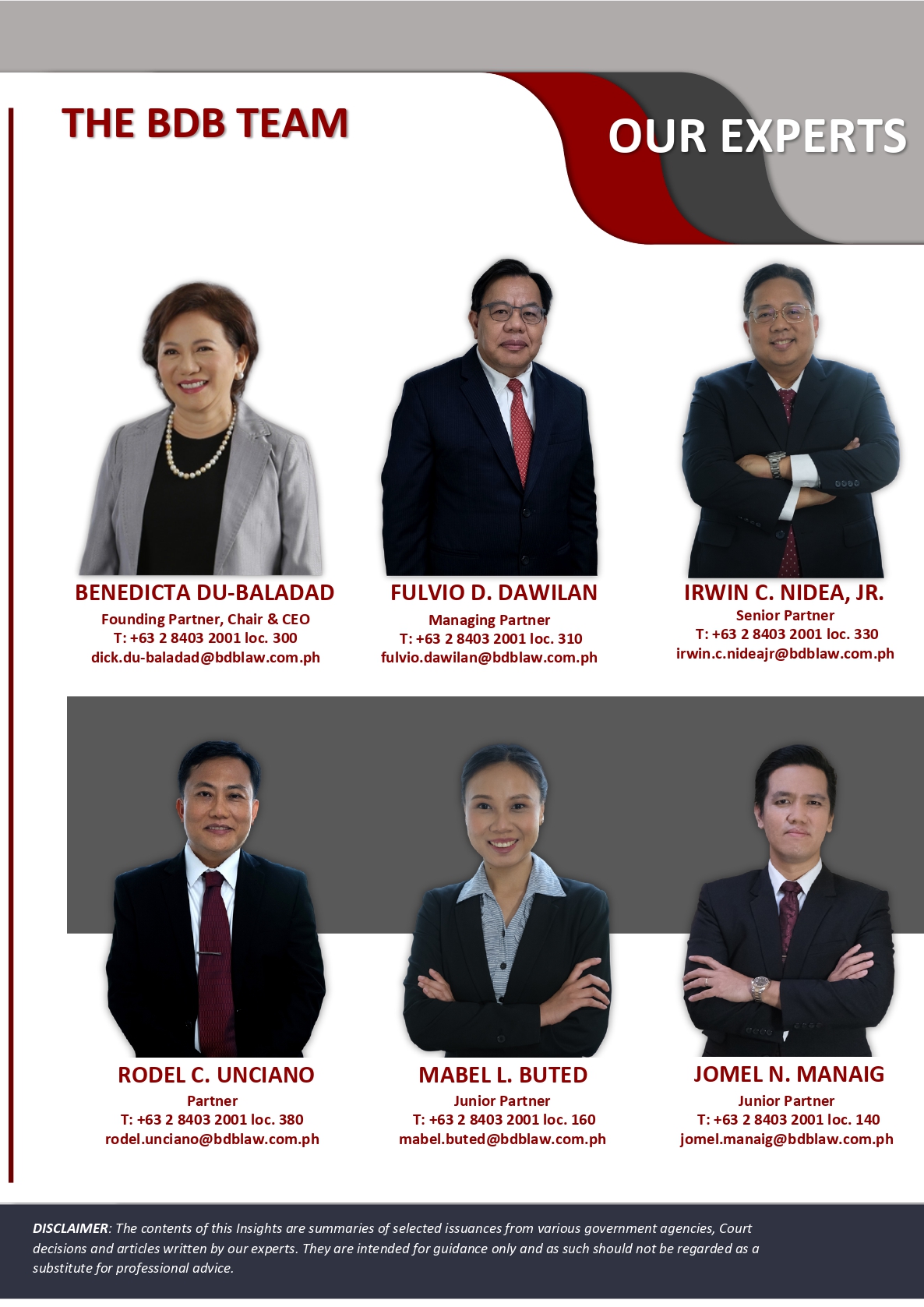
DISCLAIMER: The contents of this Insights are summaries of selected issuances from various government agencies, Court decisions and articles written by our experts. They are intended for guidance only and as such should not be regarded as a substitute for professional advice.
Copyright © 2025 by Du-Baladad and Associates (BDB Law). All rights reserved. No part of this issue covered by this copyright may be produced and/or used in any form or by any means – graphic, electronic and mechanical without the written permission of the publisher.

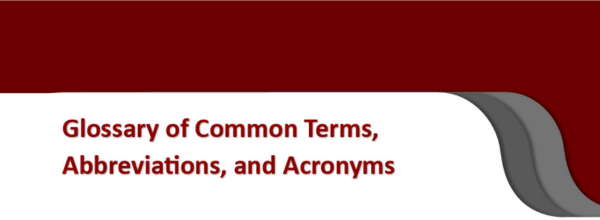
|
ABR |
- |
Annual Benefits Report |
|
ATIR |
- |
Annual Tax Incentives Report |
|
BIR |
- |
Bureau of Internal Revenue |
|
CIR |
- |
Commissioner of Internal Revenue |
|
CTA |
- |
Court of Tax Appeals |
|
EOPT |
- |
Ease of Paying Taxes |
|
IPAs |
- |
Investment Promotion Agencies |
|
IRR |
- |
Implementing Rules and Regulations |
|
FAN |
- |
Final Assessment Notice |
|
FNBS |
- |
Final Notice Before Seizure |
|
FLD |
- |
Formal Letter of Demand |
|
GS |
- |
Group Supervisor |
|
LOA |
- |
Letter of Authority |
|
NIC |
- |
Notice of Informal Conference |
|
ORUS |
- |
Online Registration and Update System |
|
PCL |
- |
Preliminary Collection Letter |
|
RA |
- |
Republic Act |
|
RBEs |
- |
Registered Business Enterprises |
|
RCC |
- |
Revised Corporation Code |
|
RMC |
- |
Revenue Memorandum Circular |
|
RMO |
- |
Revenue Memorandum Order |
|
RO |
- |
Revenue Officer |
|
RR |
- |
Revenue Regulations |
|
SEC |
- |
Securities and Exchange Commission |
|
SRC |
- |
Securities Regulation Code |
|
TCC |
- |
Tax Clearance Certificate |
|
VAT |
- |
Value Added Tax |




